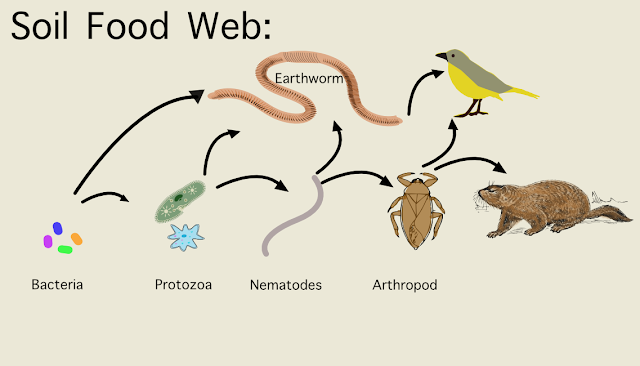Seeing earthworms around in your garden means you are having billions of
contributors to healthy soil. They are bacteria, fungi, protozoa and
nematodes. Together, they form the soil food webs.

|
|
Seeing Earthworms in the garden means there are healthy food webs in the
soil
|
What the hell do these germs, bugs and worms do to your soil?
Bacteria:
Do you know that plant root constantly release exudates with sugar,
protein and shredded root tips attract to bacteria and fungi,
boosting microbe community in the soil? It's amazing that I studied seven
yrs in agricultural major, I still didn't know that.

|
|
Plant root exudate foster bacteria in the soil
|
Bacteria produce "slime" to stick themselves on the soil particle
otherwise they will get washed away. Just think about the
"plaque" forms overnight on the teeth. Hard to remove, right? You even need
a brush.
The "slime" is a tough glue, together with the pressure of plants root
growth, will make
soil crumb structure. Within the soil crumbs, there are more spaces to store air and
water.

|
|
Soil crumbs create more spaces holding more water and air in the soil
|
Bacteria act as "storage bag" of nitrogen in the soil. Bacteria are made
of nitrogen. When they are alive in the soil, they keep the nitrogen in
their cells. When bacteria die or are eaten by their predator, protozoa,
the nitrogen will be released as digestive wastes to the soil and
available to the plants, usually in ammonium form(NH₄⁺).
Protozoa:
Who are they?
Paramecium, Amoeba, Euglena, Ciliates and Flagellates.
Protozoa are the cute little things who have only one cell and only can be
seen under microscope. They eat bacteria and fungi. When they ingest
bacteria, the waste they produced contains carbon and nitrogen available to
the plants.
Do you know that in nature, 80% of the nitrogen a plant needs comes
from the wastes produced by bacteria-and fungi-eating protozoa?
Protozoa mineralize the soil nitrogen and make it available to the
plants.
Nematodes:
Nematodes are non-segmented, blind roundworms that, along with
protozoa, mineralize nutrients contained in bacteria and fungi. Over
20,000 species have been identified so far. Some of them eat protozoa. Some
eat bacteria and fungi. Some eat living-plants, or even grub and wasp.
Some eat organic matters in the soil.
Nematodes again are big mineralizer in the soil. They ingest bacteria,
fungi, protozoa and organic matter, and then release the nitrogen once
immobilized in these microbe, usually in ammonium
(NH₄⁺) form.
Arthropod:
Mites, springtails, termites and ants.
Arthropods are shredders and aerators. They chew up organic matters in the
soil , making them small pieces. Then, fungi and bacteria can use enzyme to
decompose the small pieces.
Arthropod transport bacteria from side to side, help them spread all over.
Remember why we shouldn't touch cockroaches? Because bacteria attach
to the surface of arthropods.

|
|
Bacteria, Fungi, Protozoa, Nematodes Arthropod mammals and bird
together form soil food web
|
Earthworm:
Earthworms eat primary bacteria, along with protozoa, nematodes as
well as organic matters. Earthworms swallow the organic matters,
grinding them in their digestive trails. Finally, it's the bacteria
living in this trail can digest and produce nutrients for earthworms.
Earthworms absorb the nutrients. Any organic matter that is not fully
digested is pushed out as waste (worm casting). It is precious
soil amendment for organic gardeners.
When earthworm move in the soil in search of food, they create more pores,
channels and transport bacteria and leave their castings from side to
side.
All these contributors work for your garden soil. They improve water
holding capacity, aeration, drainage. They work like a system. Bacteria keep
nutrients the soil and protozoa mineralize them, being available to plants.
Earthworm is the omnipotent one. She swallow everything in the soil and
leave castings full of nutrients for plants.
Use compost and organic mulch to feed them , instead of
commercial fertilizer and herbicide to kill them. You will have
these soil food webs working for you.












0 Comments